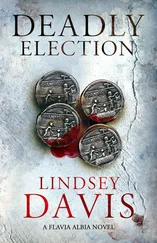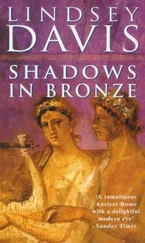Lindsey Davis - Enemies at Home
Здесь есть возможность читать онлайн «Lindsey Davis - Enemies at Home» весь текст электронной книги совершенно бесплатно (целиком полную версию без сокращений). В некоторых случаях можно слушать аудио, скачать через торрент в формате fb2 и присутствует краткое содержание. Жанр: Исторический детектив, на английском языке. Описание произведения, (предисловие) а так же отзывы посетителей доступны на портале библиотеки ЛибКат.
- Название:Enemies at Home
- Автор:
- Жанр:
- Год:неизвестен
- ISBN:нет данных
- Рейтинг книги:3 / 5. Голосов: 1
-
Избранное:Добавить в избранное
- Отзывы:
-
Ваша оценка:
- 60
- 1
- 2
- 3
- 4
- 5
Enemies at Home: краткое содержание, описание и аннотация
Предлагаем к чтению аннотацию, описание, краткое содержание или предисловие (зависит от того, что написал сам автор книги «Enemies at Home»). Если вы не нашли необходимую информацию о книге — напишите в комментариях, мы постараемся отыскать её.
Enemies at Home — читать онлайн бесплатно полную книгу (весь текст) целиком
Ниже представлен текст книги, разбитый по страницам. Система сохранения места последней прочитанной страницы, позволяет с удобством читать онлайн бесплатно книгу «Enemies at Home», без необходимости каждый раз заново искать на чём Вы остановились. Поставьте закладку, и сможете в любой момент перейти на страницу, на которой закончили чтение.
Интервал:
Закладка:
I reached the shutter; I was standing on the threshold when, within the dim interior, the steward’s wife let out a shriek.
31
The scream sounded more like surprise than anguish, but sometimes you recognise trouble. With a great struggle, I pressed myself through the narrow gap, following Graecina inside. Through the gloom, I saw why the shutter was so hard to open. Polycarpus was lying against it, in a partly bent position with his shoulders and upper body pressed against the inside of the wooden leaf, his weight jamming it.
I joined his wife as she knelt beside him. He was warm, though lifeless. Graecina was breathing fast, but she held herself together, a loyal wife and mother, refusing to give way to hysteria while there might be something necessary to do.
No chance. No pulse. No breath. No life left. I said nothing, but the wife knew too.
Together we lifted Polycarpus away from the shutter, so I could pull it open properly. We hauled him out and laid him on his back in the street. I checked again, but it was pointless. Light and air failed to revive him or alter my verdict.
I sent for a doctor anyway. A widow needs to be sure. Graecina provided an address and I told Dromo to go; I reckoned Cosmus would be unreliable.
Having brought back the cloak Graecina lent me the day before yesterday, I folded it and placed it beneath the steward’s head. It was too soon to cover over the body, not while his wife was still reluctant to accept he was dead.
Though the corpse was recognisably Polycarpus, with the same build and desert-dweller’s chin stubble, all the spry bonhomie had vanished. To me, it was no longer him.
Graecina and I sat side by side on the kerb; I held her hand. I had taken to her on first acquaintance and, unbeknown to her, we shared this hard experience. I too had once had my husband abruptly despatched, in the middle of what had seemed an ordinary, bright and sunny day. So, as the world went about its business unaware of her tragedy, I knew all too painfully what Graecina was going through.
She stayed silent. Some people immediately become stupefied. Others of us clench up and fall into deep thoughts, planning ahead, already readjusting because we need to be ready, we need to be strong.
She would be thinking about her children — how to tell them, how to console them, how then to provide for them, on her own, in whatever difficult future lay ahead. I had not had that worry, but on the other hand, when my husband died suddenly, he left me to a life alone. That’s hard, even if you call yourself tough. As far as I knew, her children were still young, and so Graecina would at least have someone to talk to, cry with, even snap at when everything became too difficult. The infants would grow up. They would grow up fairly well, I thought, from the little I had seen of her. She would have her family.
The hairy dog came over and licked Polycarpus gently. His manner was sad and respectful, as if he realised he was saying farewell. This is why I like dogs.
He sat down beside the body, a couple of feet from Graecina and me, sharing our vigil. Occasionally he had to scratch at a flea, but he did so unobtrusively. He seemed to understand our sadness, and wanted to be part of the scenario.
The dog’s behaviour contrasted with that of the slave Cosmus, who had mooched to a new spot outside a cutler’s shop. He was staring at the goods on show, as if he had not seen us bring his master’s body out. I worry about young boys who gawp at knives — though many of them do it, some never actually reaching the stage of owning one.
When Dromo brought the doctor, he said Polycarpus had died of heart failure. The man needed to see an oculist.
It must be true that the steward’s heart had failed at some point. He had told me he had been freed for five years, making him in his mid to late thirties, young for this to happen unexpectedly. There had been no sign that his heart was diseased, no warning that his body was liable to fail him. He had never lived foolishly. Yet plenty of people leave the world at his age or younger.
Stress could have caused a heart attack. If he had been in an argument prior to his death, it was not with Graecina; I myself saw her arrive on the scene. Watching her discover the body, I had witnessed true shock.
Her grief was real too. ‘Why?’ she asked, fixatedly. People do ask that, and generally there is nothing you can say in reply.
I knew that heart failure alone did not kill the steward. The doctor saw nothing amiss, but I had noticed immediately: Polycarpus had been attacked.
It was probably quick and simple. There were no self-defence bruises, no rope around the steward’s neck and no rope burns. But I could see tell-tale fingermarks.
I answered the wife’s question. She had the right to know. ‘Look at his throat here, Graecina. Somebody strangled him.’
32
I decided to involve the vigiles. I had no doubt Polycarpus’ death was related to the murders of his master and mistress. If I failed to notify the Second Cohort, it might cause problems. This was a high profile case.
Again, I sent Dromo. He had not evolved by magic into someone helpful; we had had no lunch and it would not happen in the near future. He would soon start to nag me. To pre-empt the misery, I gave him a few coppers, with orders to go to the station house with my message first, then buy himself a cake on the way back. He skipped off eagerly.
Covered with crumbs, he returned with Titianus. Even the vigilis appeared to be chewing. I was stuck with him; he would probably fail to investigate properly all over again. Sighing internally, I sent off Dromo for an undertaker, ignoring his pleading looks for more tuck money.
Titianus took the line that I was trouble. Nevertheless, he did not exclude me from his thoughts, which were as hidebound as ever. He immediately swore this was a second murder by the same parties. He had hardly looked at the corpse or considered the circumstances.
I pointed out quietly that the original group of slaves had certainly not carried out this killing, because not only were they under guard at the aediles’ office on the Aventine, as Titianus well knew, but I had actually seen them that morning and could give them all alibis. This confirmed his bitter theory that I was a menace, intent on ruining his life. Still, he settled down to do his job, while I tried to make his efforts fit with mine.
Polycarpus must have been murdered during my walk back to the Esquiline. I mentioned that the body had been warm when I first touched it. Titianus borrowed a stylus from me and wrote that down on a waxed tablet, asking how to spell ‘temperature’. He got lost in the middle of the word and had to ask twice.
At least he paid attention to the time-of-death issue, though he only wanted to know because the closer death occurred to the discovery of the corpse, the shorter the time period Titianus would need to cover in his enquiries. I already knew he was a minimalist. But there was no hope he would give up and leave things to me.
He went over to the nearest bar and asked if anyone had witnessed the killer entering the shop while Polycarpus was inside. Of course not. People spend their time at bar counters staring out at the street, but nobody ever really sees anything that happens. Zeus could descend in a shower of gold and rape that fat woman at the bread counter, the one with the daughter-in-law who ran off with a sailor, but the divine apparition would pass unnoticed.
The same drinkers now stayed on, to gawp at the dead body.
Anyone else walking down the street at the crucial moment was long gone. People slip in and out of shops all the time, even when they are empty or closed. This is daily life. No one ever takes it in. If there had been a noisy altercation, nobody had heard it. If they had, they would have walked on faster.
Читать дальшеИнтервал:
Закладка:
Похожие книги на «Enemies at Home»
Представляем Вашему вниманию похожие книги на «Enemies at Home» списком для выбора. Мы отобрали схожую по названию и смыслу литературу в надежде предоставить читателям больше вариантов отыскать новые, интересные, ещё непрочитанные произведения.
Обсуждение, отзывы о книге «Enemies at Home» и просто собственные мнения читателей. Оставьте ваши комментарии, напишите, что Вы думаете о произведении, его смысле или главных героях. Укажите что конкретно понравилось, а что нет, и почему Вы так считаете.












